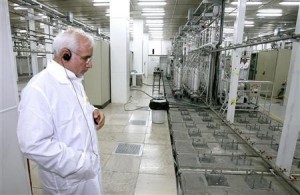 AFP -�Iran hopes to reach a "comprehensive agreement" with UN nuclear agency experts during talks in Tehran on Wednesday over the Islamic republic's disputed atomic activities, the foreign ministry said.
AFP -�Iran hopes to reach a "comprehensive agreement" with UN nuclear agency experts during talks in Tehran on Wednesday over the Islamic republic's disputed atomic activities, the foreign ministry said.Ministry spokesman Ramin Mehmanparast meanwhile announced Tuesday that Tehran and world powers had agreed on a date but not the venue for the next round of talks in parallel diplomatic efforts to resolve the crisis over Iran's nuclear ambitions.
"We hope for a comprehensive agreement to be reached in discussions" on Wednesday when a team of International Atomic Energy Agency (IAEA) experts are expected in Tehran for a day of intense discussions, Mehmanparast said at his weekly press conference.
But agreement, he said, would only be possible if Iran's "nuclear rights" are recognised by the UN agency.
"If we are to reach a deal and address alleged concerns, the other party's commitments should be fully clear... We expect the agency to fully respect our nuclear rights," he said.
The IAEA experts are visiting Tehran for the second time in less than a month, hoping to strike a deal forcing Iran to respond to what the Vienna-based agency calls "overall, credible" evidence nuclear weapons research work being conducted in the Islamic republic until 2003 and possibly since.
Iran vehemently denies seeking or ever having wanted the bomb and says that the IAEA's conclusions are based on forged documents -- material that it has not even been allowed to see.
Meanwhile, Mehmanparast said negotiations with the so-called P5+1 group are expected to be resumed when the venue for a new round of discussion is agreed by all sides.
The date for a new round "was agreed last night in a phone conversation" between Iran's deputy nuclear negotiator Ali Bagheri and EU foreign policy deputy chief Helga Schmid, he said without specifying the date.
Schmid -- whose boss Catherine Ashton represents the P5+1 nations of Britain, China, France, Russia, the United States, and Germany -- "must as soon as possible convey the group's proposal for the venue so we can resume the talks," Mehmanparast added.
The P5+1 engaged Tehran three times in 2012, in a bid to address Western fears that Iran's atomic energy programme is aimed at acquiring a weapons capability.
The last high-level talks, which all but failed, were held in Moscow in June, with Tehran rejecting P5+1 calls for it to scale back its nuclear work.
Mehmanparast on Tuesday implicitly ruled out the possibility of the IAEA team being granted access to the Parchin military base near Tehran, where the Vienna-based agency suspects that experiments with explosives capable of triggering a nuclear weapon could have been carried out.
"Parchin has no connection with Iran's nuclear activities," Mehmanparast said, adding that the issue of Parchin could be discussed but in the context of a possible comprehensive agreement.
IAEA's hopes of reaching a deal with Tehran were not high, however.
The UN body's head Yukiya Amano said Friday that he was "not necessarily optimistic" and one Western diplomat told AFP Sunday "there still remain some pretty big disagreements" with Tehran.
By AFP
The Iran Project is not responsible for the content of quoted articles.










